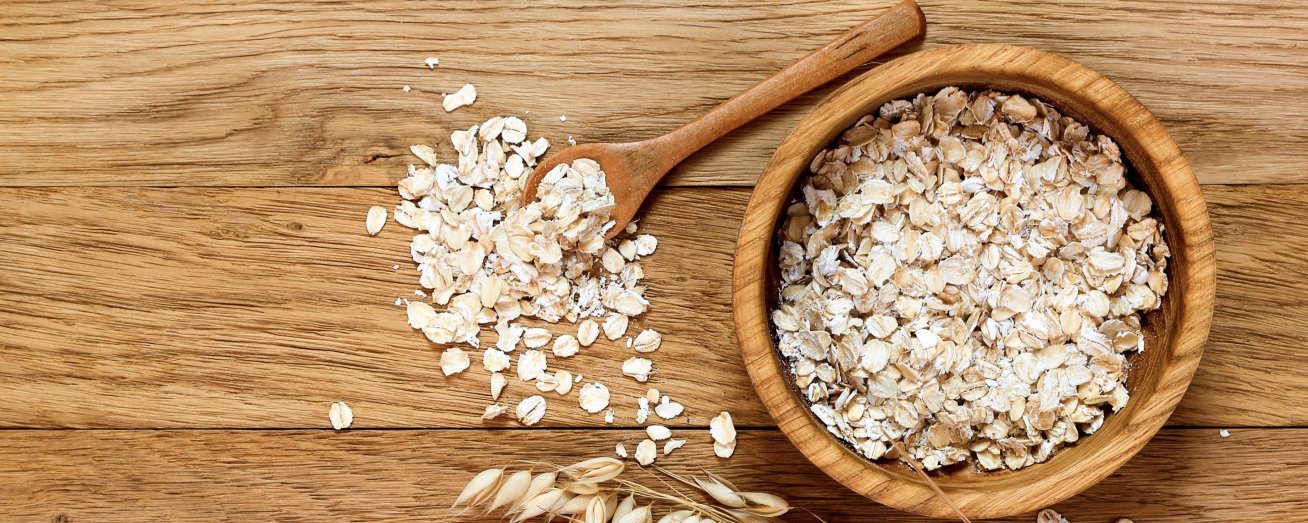The vast majority of people with celiac disease can include uncontaminated oats in their gluten-free diet. A small percentage of people with celiac disease are sensitive to oats and should avoid them.
Historically it was advised that oats should be excluded from a gluten-free diet by most UK centres, however a number of studies presented from the mid-1990s onwards have indicated that uncontaminated oats are tolerated by most people with celiac disease [1, 2]. National Institute for Health and Care Excellence (NICE) guidelines advise that people with celiac disease can choose to introduce gluten-free oats into their diet at any stage and that the decision to continue including them depends on their immunological, clinical or histological response [3].

Why include oats in a gluten-free diet?
The inclusion of wholegrains (such as oats) within the diet can reduce the risk of heart disease by 15% [6]. Oats are low in fat and high in soluble fibre and have a low glycaemic index. Their inclusion within the gluten-free diet is particularly useful in people with coexistent diabetes mellitus, helping to regulate blood sugar levels and support weight management. Rich in soluble fibre, oats provide benefits to the gastrointestinal system; maintaining overall gut health, increasing stool weight and decreasing constipation [7]. Furthermore, research suggests that a gluten-free diet may be deficient in a number of nutrients including fibre and B-vitamins [8,9]. Oats may help to offset such deficiencies by providing a good source of protein, fibre, B-vitamins, magnesium, phosphate, zinc, selenium, iron.
The future for oats
Several studies have shown that oats are well tolerated by the majority of people with celiac disease [1,2,10]. However, a small number of people with celiac disease are sensitive to oats and their intestinal immune status fails to normalise when oats are included in the diet. In these individuals, a strong intestinal T-cell response towards oats has been observed [11], leading to the future possibility of identification of mucosal markers for oat sensitivity amongst celiac disease [12]. It is understood that some oat strains contain more toxic prolamins than others and further research is needed to develop oat strains with a low avenin content and low immunogenicity [13]. The long term impact of eating oats in those who seemingly tolerate them also needs to be reviewed, as few studies have looked at the long-term effects of oat inclusion.
Gluten-free oats
Not all oats are suitable for inclusion within a gluten-free diet owing to the likelihood of contamination with gluten-containing cereals during growing or processing. The only oats suitable for inclusion within a gluten-free diet are certified (uncontaminated) ‘gluten-free oats’. Labelling terms such as ‘pure’, ‘organic’ or ‘100% oats’ do not indicate suitability for inclusion. In order to use the claim ‘gluten-free’, manufacturers must comply with legislation that guarantees their products (including those containing oats) contain less than 20ppm (parts per million) of gluten [4].
Why do oats seem to be tolerated by most people with celiac disease?
Oats contain avenin, a prolamin (storage protein) that is similar to those included under the umbrella term of ‘gluten’, found in wheat, rye and barley. However, most people with celiac disease seem to be able to tolerate uncontaminated oats. This may be because there are fewer toxic epitopes in oats compared to wheat, rye and barley (although this may vary, between oat cultivars). Avenins may also be more susceptible to breakdown in the gut, rendering them less toxic [5].
For the vast majority of people with celiac disease oats are well tolerated and provide benefits in terms of nutrition, variety and taste.
Further research is needed to examine why a small number of people with celiac disease are unable to tolerate uncontaminated oats and what strains of oat cultivar, in what amounts are optimal for ensuring tolerance across all individuals.
References
- Janatuinen EK et al. A comparison of diets with and without oats in adults with celiac disease. N Engl J Med. 1995; 333: 1033-7
- Srinivasan U et al. Absence of oat toxicity in adult coeliac disease. BMJ 1996; 313 (7068): 1300-1301
- NICE 2015
- Codex Standard for Foods for Special Dietary Uses for Persons Intolerant to Gluten. 2008
- Lundin K. Oats in coeliac disease – do we have the full picture? Coeliac UK Research Conference, London: 2016
- Tighe P et al. Effect of increased consumption of whole-grain foods on blood pressure and other cardiovascular risk markers in healthy middle-aged persons: a randomized controlled trial. The American Journal of Clinical Nutrition 2010; 92: 733-740
- Thies F et al. Oats and bowel disease: a systematic literature review. Br J Nutr.2014; 112 Suppl 2:S31-43
- Hallert C et al. Evidence of poor vitamin status in coeliac patients on a gluten-free diet for 10 years. Ailementary Pharmacol & Therap 2002; 16: 1333-39
- Kinsey L. et al. A dietary survey to determine if patients with coeliac disease are meeting current healthy eating guidelines and how their diet compares to that of the general population. European Journal of Clinical Nutrition 2007; 1-10
- Cooper SEJ et al. Immunological indicators of coeliac disease activity are not altered by long-term oats challenge. Clin Exp Immunol 2013; 171(3): 313-318
- Arentz-Hansen H et al. The molecular basis for oat intolerance in patients with celiac disease. Published online 2004; doi: 10.1371/journal.pmed.0010001
- Sjborg V et al. Non-contaminated dietary oats may hamper normalization of the intestinal immune status in childhood celiac disease. Clin Transl Gastroenterol. 2014; 5(6): e58
- Ciacci C et al. The gluten-free diet and its current application in coeliac disease and dermatitis herpetiformis. United European Gastroenterol J. 2015; 3(2): 121–135.
